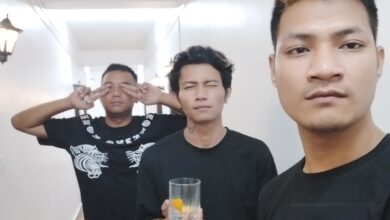Away from the digital chaos… with the Swami
Swami Vivekananda’s wisdom on mindfulness helps navigate the challenges of digital age

 Swami Vivekananda, born Narendranath Datta on January 12, 1863, died on July 4, 1902, at the age of 39 at Belur Math. As we celebrate the 161st birth anniversary of this spiritual giant, let us recall how Swami Vivekananda introduced the Hindu philosophies of Yoga and Vedanta to the West.
Swami Vivekananda, born Narendranath Datta on January 12, 1863, died on July 4, 1902, at the age of 39 at Belur Math. As we celebrate the 161st birth anniversary of this spiritual giant, let us recall how Swami Vivekananda introduced the Hindu philosophies of Yoga and Vedanta to the West.
In this digital age where humans are running a rat race, his ideas of mindfulness and mental health hold the key to a balanced future, as his wisdom continues to guide us towards inner strength, self-realisation and unity.
In the bustling world of the digital age, where technology advances at a rapid pace and our lives are intertwined with smartphones and screens, the relevance of mindfulness and mental health has become more critical than ever. The 19th-century monk, Swami Vivekananda, offered profound insights into the human mind and the practice of mindfulness.
His teachings — learned from his guru Ramakrishna Paramhansa — though timeless, hold remarkable significance in navigating the challenges of the modern era and cultivating mindfulness for attaining inner peace and spiritual growth. He viewed the mind as a powerful instrument capable of creating both misery and happiness and mindfulness as a method to harness its potential for the latter. In his words, “The mind is like water, when it’s turbulent, it’s difficult to see. When it’s calm, everything becomes clear.”
The digital revolution has undoubtedly transformed our lives, providing us with unprecedented access to information, communication and entertainment. However, this constant connectivity comes at a price.
Research has shown a significant correlation between the excessive use of digital devices and mental health issues such as anxiety, depression, and loneliness. The addictive nature of social media platforms and the continuous bombardment of information can lead to increased stress and decreased attention spans. Swami Vivekananda’s insights into mindfulness remind us that the key to mental well-being lies not in escaping from the digital world, but in finding balance and using technology mindfully.
One of the most practical applications of Swami Vivekananda’s mindfulness teachings is ‘breaking free’, and when applied in this context, it is directly related to the concept of a ‘digital detox’.
By consciously unplugging from digital devices for a designated period, we can break free from the incessant stimulation and cultivate a calm and focused mind. This practice allows us to reconnect with ourselves, nature and others, fostering a sense of real presence and fulfilment. This enables us to be not only selective about the apps and content we engage with but also helps us to identify using technology with a purpose and setting boundaries to prevent overconsumption.
One key feature of Swami Vivekananda’s teachings was his emphasis on empathy and compassion, which remind us of the importance of understanding and respecting others’ emotions and viewpoints. Here we may realise that this is not possible through a digital-based communication system, which has become the order of the day, because text-based interactions often lack the nuances of face-to-face communication.
Swami Vivekananda strongly believed in the transformative power of positive thinking. In the digital age, where negative news and information are readily available, practising positive thinking can serve as a shield against the detrimental impact of excessive negativity. He said, “We are what our thoughts have made us; so, take care about what you think. Words are secondary. Thoughts live; they travel far.”
By consciously choosing positive thoughts and affirmations, we can build inner resilience and strengthen our mental well-being amidst the digital chaos.
Swami Vivekananda further emphasised the importance of self-reflection and introspection as a means to understand oneself deeply — which yoga gurus and other masters or professional trainers are offering at a heavy course price — and thereby introspect to ‘break free’ from external stimuli.
By disconnecting from the digital world and turning inward, we can gain clarity, identify our values and align our actions with our true selves. Researchers have also found that practising mindfulness can help individuals develop a healthier relationship with technology, reduce addictive behaviours and improve attention and cognitive control.
Numerous studies have shown the benefits of mindfulness practices in reducing stress, improving cognitive function, and enhancing overall well-being. Mindfulness-based interventions have been incorporated into various therapeutic approaches, including cognitive-behavioural therapy and mindfulness-based stress reduction programs.
In a report titled ‘World Unhappier, More Stressed Out Than Ever’, the writer Julie Ray gives grave statistics. Julie says, “In 2021, four in 10 adults worldwide said they experienced a lot of worry (42%) or stress (41%), and slightly more than three in 10 experienced a lot of physical pain (31%). More than one in four experienced sadness (28%), and slightly fewer experienced anger (23%).”
Julie further points out that already — “at or near record highs in 2020” — these experiences of stress, worry and sadness ticked upward in 2021 and set new records. Worry rose by two points, while stress and sadness increased by one point each.
The percentage of adults worldwide who said they experienced pain also rebounded two percentage points, matching levels more in line with previous years’ estimates. The only silver lining was that reports of ‘anger’ did not increase in 2021, dropping a single point from 24% in 2020.
Swami Vivekananda’s wisdom on mindfulness and mental health offers invaluable guidance in navigating the challenges of the digital age. As technology continues to advance, it is essential to pause, reflect, and incorporate mindfulness into our lives to maintain a healthy balance between the virtual and real worlds.





